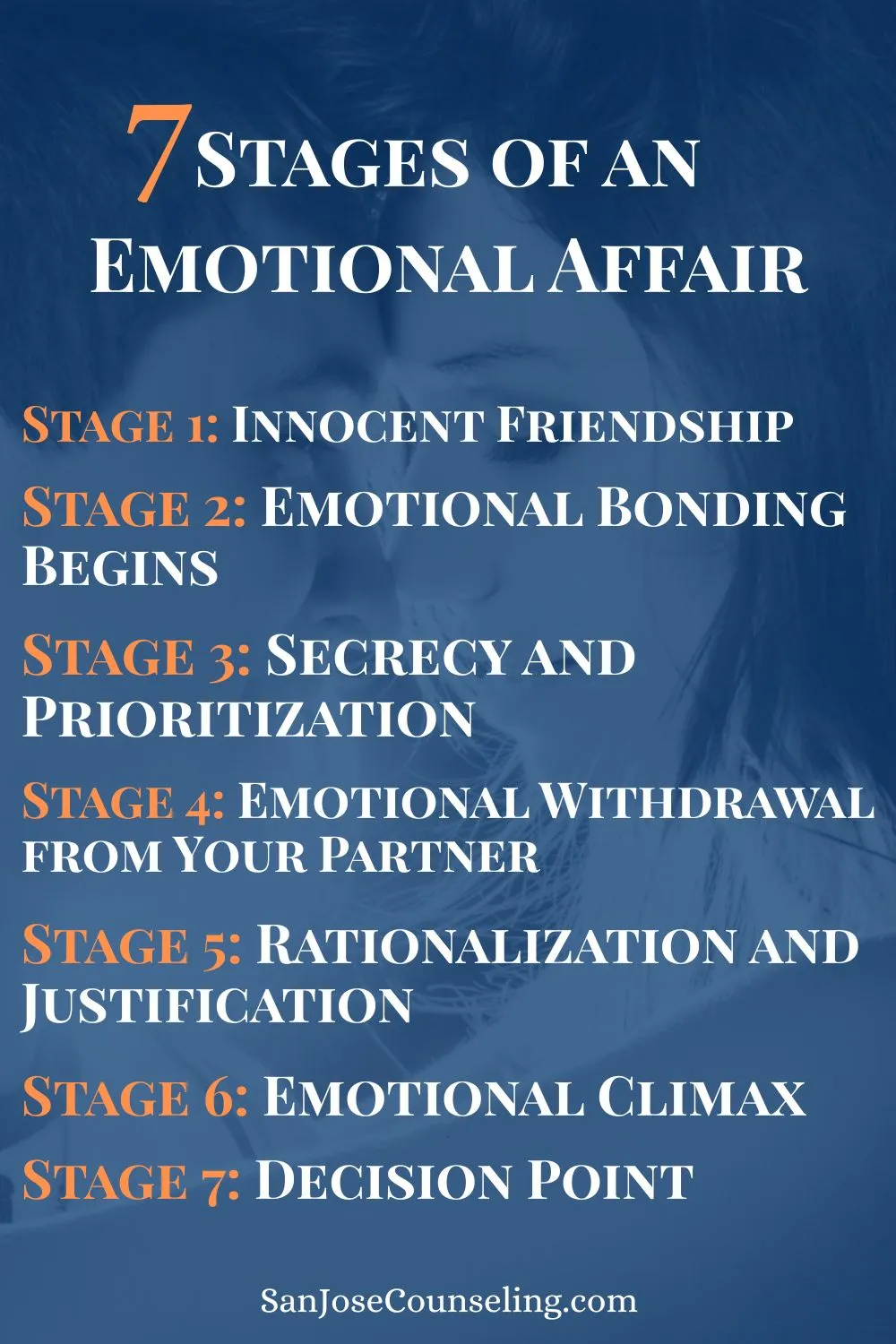Seek Therapy
408-920-1730
7 Stages of Emotional Affair and Healing Without Hurting Anyone.
You never intended for it to happen, but emotional affairs often start slowly. More often than not, a bond develops, and before you know it, you're emotionally attached to someone who is not your partner.
In 2025, infidelity is still common and emotional affairs are often overlooked and disregarded. Studies suggest that 35% of married people in the U.S. admit to cheating at least once.
In this guide, we will break down the 7 stages of emotional affairs so you can recognize red flags and work towards healing.
A free consultation with Dr. Invia is a chance to talk through what’s going on and see if therapy might be a helpful step toward rebuilding trust and emotional closeness in your relationship.
What Is an Emotional Affair?
Relationship scientist Dr. Marisa T. Cohen says, "An emotional affair is when a partner is intimate with another person in a non-physical manner, for example, confiding in someone outside of the relationship."
While physical affairs involve infidelity based on physical intimacy, emotional affairs are built on deep emotional connection in the relationship.
Things such as secrecy, emotional attachment, and putting another person ahead of the spouse or partner can be considered emotional affairs.
Emotional Affair vs. Physical Affair vs. Friendship
Knowing the distinctions between emotional affairs, physical affairs, and normal friendships is the first step toward realizing that appropriate boundaries have been crossed.
In contrast to physical cheating, emotional cheating doesn't involve physical intimacy. However, emotional cheating can also impact relationships profoundly as it can involve secrecy, emotional distance, and trust issues.
The table below outlines how emotional affairs compare to physical infidelity and healthy friendships to better help you understand where emotional connections may become problematic.
Aspect | Emotional Affair | Physical Affair | Friendship |
Intimacy Level | Deep emotional connection | Physical intimacy | Supportive but non-romantic |
Secrecy | Often hidden from partner | Usually secretive | Open and transparent |
Impact on Relationship | Erodes trust, emotional intimacy | Breaks physical boundaries | Strengthens social bonds |
Romantic Feelings | Often present | Always present | Typically absent |
Based on these differences, it is clear emotional cheating is not "harmless." Emotional cheating can erode trust and emotional intimacy just as much—as well as physical affairs—even more extensively.
Recognizing the signs of emotional cheating early on can help you safeguard your relationship and establish clear boundaries.
Why Do Emotional Affairs Happen?
Emotional affairs can start off innocently and often do so because emotional needs are unmet, the person has low self-esteem, and connecting with others online is a very easy process.
Many people in unhappy relationships feel unheard, disconnected and unwanted. They often will seek emotional validation outside their relationship without consciously knowing it.
Social media and online communities make emotional bonding easy - so easy, in fact,that a 5-minute conversation can turn into deep emotional intimacy.
Even neuroscience tells us that if a person is being emotionally intimate consistently, they become emotionally attached. As emotional exchanges occur, the brain releases oxytocin and dopamine, further reinforcing the connection making it harder to step away.
How Do You Know If You’re in an Emotional Affair?
Narcissism is a range, and there are subtle differences between overt and covert narcissism.
Are you sharing personal thoughts with someone? Prioritizing someone else over your partner? Keeping conversations a secret? This is emotional infidelity. What are some more specific signs to look for?
Here are some signs of an emotional affair in the workplace:
- Increased excitement about seeing a specific colleague
- Frequent private conversations or texting with the colleague off the clock
- Growing emotionally withdrawn from your partner
- Becoming defensive when questioned about the other relationship.
Once you recognize these signs, you can set boundaries and take the necessary steps to protect your relationship.
The 7 Stages of an Emotional Affair

Emotional affairs rarely happen overnight, they happen in stages – 7 stages to be exact, and they happen so subtly that we often don’t realize the dynamic has changed until we are battling to save a deeply affected relationship.
What starts as a harmless connection slowly transforms into emotional dependency, deception and betrayal. Understanding these 7 stages can help you recognize warning signs early on and save your relationship.
Stage 1: Innocent Friendship
At first everything seems innocent. You meet someone (might be a co-worker, a friend online, or an acquaintance) and you naturally engage in conversations or activities together based on common interests!
There is no intention to betray your partner whatsoever! The relationship feels strictly platonic!
Warning Signs
- You're excited to talk to this person more than normal.
- The frequency of daily conversations goes up, and maybe you even have a small little "spark" of excitement when you are talking with them.
- You are starting to share personal information that you would rarely share with anyone.
Tip: What to Do Here
Again, an awareness of this stage is crucial. If you notice that you are continuing to prioritize this connection or find yourself emotionally drawn in, create some boundaries.
Try to keep conversations with this person as transparent as possible while you consider your emotional energy still directed to your primary relationship.
Stage 2: Emotional Bonding Begins
A strong emotional bond grows in this stage. Communication is more personal at this point, and you're sharing feelings and experiences - things that you probably aren't sharing with your partner. The emotional connection grows stronger, and each conversation feels meaningful and fulfilling.
Warning Signs
- You're excited to talk to this person more than normal.
- You're sharing personal struggles, emotions and/or fears that you are not discussing with your partner.
- You feel they understand you better than your partner does.
Tip: What to Do Here
Stop and ask yourself - am I looking for emotional affirmation that I am not finding within my relationship? If the answer is yes - you should question your emotional needs and speak with your partner about your emotions before this connection deepens.
Stage 3: Secrecy and Prioritization
The emotional connection is becoming more important than your primary relationship. You might conceal your interactions, feel guilty about them or justify why this connection is "innocent." The secrecy can even add excitement, making it even more difficult to detach from.
Warning Signs
- You are deleting messages or avoiding conversations about this person.
- You prioritize the conversations over spending time with your partner.
- You are feeling irritable or distant in your primary relationship.
Tip: What to Do Here
Be honest. If you are questioning the need to hide something from your partner, consider why you might feel that way.
If you are wrestling with emotional distance from your partner, try to solve it. The solution can help in preventing an emotional betrayal later.
Stage 4: Emotional Withdrawal from Your Partner
At this stage, the emotional affair is starting to change the way you are operating in your primary relationship.
You may feel less connected to your partner, possibly avoiding deep conversations altogether, or even beginning to feel irritated when being around your partner.
The emotional energy that was present in your relationship is being diverted by the emotional affair.
Warning Signs
- You spend less time talking to your partner.
- The conversations feel forced or distant.
- You find yourself comparing your partner to the affair partner and see their flaws more.
Tip: What to Do Here
Recognize the emotional energy shift. Rather than withdrawing, just be open with your partner about your emotional needs.
Take some time to strengthen this relationship before the damage gets deeper.
Stage 5: Rationalization and Justification
At this point, you convince yourself that the emotional affair is either harmless, or even necessary.
You may convince yourself that you're simply friends or that your partner doesn't understand you the way this person does.
The emotional connection is growing deeper, which makes it more difficult for you to realize what you are doing.
Warning Signs
- You're rationalizing the emotional connection in your mind.
- You're defending your emotional relationship when asked questions that reveal cheating.
- You believe your partner is at fault for your emotional connection, and not your actions or decisions.
Tip: What to Do Here
Take some time out and be honest with yourself. If you are rationalizing being secretive with someone or prioritizing someone else, you need to resolve these issues, so that further damage is not done.
Stage 6: Emotional Climax
At this stage, the emotional affair is in full swing. The emotional connection is incredibly powerful and oftentimes provides more emotional fulfillment than your primary relationship.
You may even start to fantasize a future with that person or feel like you are caught between two people.
Warning Signs
- You confide in this person more than your partner.
- You feel emotionally dependent on this person's support and validation.
- You fantasize about a future with them while questioning your current relationship.
Tip: What to Do Here
If you really feel emotionally attached to this person you need to think seriously about your relationship and talk frankly with your partner.
Also seek professional couple and marriage counseling to find a way to navigate through the emotional level of the affair before your relationship suffers permanent damage or worse.
Stage 7: Decision Point
This is the pivotal moment of the emotional affair. You have reached a decision point whether to formally end the emotional relationship or allow it to evolve into something else.
By this point, the sense of emotional bond and connection with this person is very strong and you may feel overwhelming guilt or confusion.
You may feel torn between your primary relationship and the emotional bond you formed with the affair partner.
Warning Signs
- You wrestle with feelings of guilt or uncertainty but still feel drawn to the affair partner.
- You make excuses for ways to continue the emotional connection.
- You feel emotionally exhausted and confused about what to do next.
Tip: What to Do Here
If you want to save your primary relationship, being honest with yourself and that person is important. You need to start by acknowledging their relationship.
Have an open and honest conversation with your partner about what has been going on. If you need help, do it. Recovery is possible but will only happen with a conscious decision.
The Ripple Effects of an Emotional Affair
An emotional affair has implications not only for the individuals directly involved, but also for others connected to them.
What starts as an innocent connection can potentially cross the line into betrayal trauma, trust issues, and emotional distress that can be equally as devastating and damaging as physical infidelity.
1. Impact on the Betrayed Partner
The discovery of an emotional affair is awful.
Most partners experience profound loss, betrayal, mental anguish, feelings of rejection, anxiety, frustration and self-doubt as they realize that they no longer know their partner and distrust may become a permanent part of the relationship.
2. Impact on the Relationship
An emotional affair destroys trust and creates barriers, distance, loss of trust, and a break in communication. This is a result of the secrecy surrounding the affair as there is now tension and emotional withdrawal, which can make reconnecting to repair the relationship almost impossible. If not addressed on time, it may push the relationship toward separation or divorce.
3. Impact on Children, Finances, and Social Circles
The effects of the emotional affair are not confined to the couple's relationship.
Children pick up on emotional disconnections and may experience confusion and/or distress; they are likely aware of conflict or disconnection even if the details of the emotional affair are unknown.
Financial issues may also arise if the affair leads to separation. Social circles may feel divided, either through direct involvement or as mediators, or by simply taking sides.
What may have initially started as a private emotional connection can quickly destroy lives.
Healing After an Emotional Affair Without Hurting Anyone

Healing from an emotional affair will take honesty, patience, and commitment from both partners.
The objective isn't simply moving on past the betrayal trauma, but to restore the trust and emotional intimacy to better strengthen the relationship.
The healing process for the betrayed partner lies in acknowledging their emotions, which often include anger, sadness, and confusion.
These are all normal responses. Having difficult conversations, instead of accusations and blame, can pave the way for understanding.
For the partner who cheated, accepting responsibility for their actions is vital. Show that you know how the affair modified the perspective of the relationship and demonstrate as much remorse as you feel for the pain you've caused.
Summing Up
Emotional infidelity often can begin innocently, but can escalate quickly into secrecy, emotional attachment and betrayal.
The 7 stages illustrate how bonds develop, and create imprints that can have lasting effects on trust, relationships and emotional health.
Recognizing the bonds early can prevent deeper hurt and help begin the process of healing. Whether you are trying to avert, stop, or recover from an emotional affair, an experienced professional can help.
Dr.Invia's Free Consultation provides you with an expert to help you rebuild trust and emotional safety amongst yourself and others.
Now is the time to take action—book your free consultation today to start healing!
FAQ
How Do Emotional Affairs Usually End?
Typically an emotional affair ends in discovery, guilt, or emotional fatigue. Some emotional affairs fade naturally as reality settles in, while others may end with broken relationships, or maybe an emotional affair turns into an actual physical affair.
In many cases, the betrayed partner finds out, and then they have to make a healthy decision to either restore trust or walk away.
Why Do Men Engage in Emotional Affairs?
Men often become emotionally involved with another woman when their emotional needs aren’t being met, they’re seeking validation, or they’re simply unhappy in their relationship.
Some men are just seeking comfort, adventure, or escaping their ordinary routine.
Others have unknowingly made emotional connections that cross boundaries, considering how workplace and online relationships make cheating easier.
Why Would Someone Emotionally Cheat?
People "emotionally cheat" when they are emotionally disconnected in their relationship and, in a way, seek validation, excitement, or a deeper connection somewhere else.
Factors such as low self-esteem and lack of boundaries strengthen emotional affairs, and social media can make emotional cheating easier to do.
Most people do not realize they are emotionally cheating until the bond becomes deeper than they would like.


